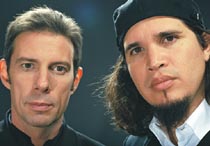-
(单词翻译:双击或拖选)
HOST:
Welcome to AMERICAN MOSAIC1, in VOA Special English.
(MUSIC)
I'm Doug Johnson. On our show this week:
We answer a question about advertising2 ‿/P>
Play some music from Thievery Corporation ‿/P>
And report about Saint Patrick's Day.
Saint Patrick's Day
 |
| Celebrating St. Patrick's Day the American way |
FAITH LAPIDUS:
Saint Patrick’s Day has changed over the years. It is no longer a day to celebrate only Saint Patrick, but a day to celebrate all things Irish.
In nineteen ninety-five, the United States Congress declared the month of March as Irish-American Heritage Month. The American president releases a statement about it every year. The statement praises Americans whose families came to the United States from Ireland. And it calls on all Americans to celebrate the month by learning about the influence of Irish-Americans.
The Census3 Bureau reports that more than thirty-four million Americans say their ancestors came from Ireland. That is twelve percent of the country’s population. It is the nation's second most frequently reported ancestry4. German ancestry is the highest. The state with the highest percentage of Irish-Americans is Massachusetts. Twenty-four percent of the people living there say their ancestors came from Ireland.
History experts say people from Ireland first celebrated5 Saint Patrick’s Day in the city of Boston about two hundred fifty years ago. But the first Saint Patrick’s Day parade was held in New York City on March seventeenth, seventeen sixty-two. It included Irish soldiers who were serving in the British army.
Parades spread across the country as more and more Irish people came to America. But New York City’s parade is still the biggest one. The city of Chicago, Illinois also holds a large Saint Patrick’s Day parade. And it celebrates Saint Patrick’s Day by coloring its river green.
Green is the traditional Irish color. You see lots of it on Saint Patrick’s Day. People wear green clothes. Some even color their hair or faces green. And some drinking places serve green beer. Many people eat the traditional Irish meal of corned beef and cabbage. And many attend Saint Patrick’s Day parties.
A majority of Americans have no real connection to Ireland. But they like to say that everyone is a little bit Irish on Saint Patrick’s Day.
Advertising and Propaganda
This week, our listener question comes from Curitiba, Brazil. Joalo Ademir dos Santos wants to know about propaganda, advertising and publicity6.
In some ways these words have similar meanings, but they are each a little different. Propaganda is a message designed and spread to influence public opinion. It is most commonly used by governments and in politics. Before the twentieth century, pictures and written media were the main forms of propaganda.
Today, propaganda can be found in radio, television, movies, and the Internet. Many governments throughout history have used propaganda to gain the support of their public. Propaganda does not always include neutral information because it supports the opinion of one group or government.
During wartime, propaganda created by a government and directed at its own civilians7 and military can improve feelings about the country. Propaganda aimed at the enemy is considered a form of psychological warfare8. Many governments use propaganda as a policy tool. However, experts debate its effectiveness.
 |
You can see and hear advertisements on radio, television, newspapers, the Internet and even signs on the street. Businesses invest large amounts of money in advertising campaigns in order to make their products well known. Advertising has become a major part of life. Experts say most people see and hear hundreds of different advertising messages each day.
Publicity is usually information or an announcement about a person, group, event or product. It is sent to the media with the hope of being published or broadcast. An organization's public relations department usually creates publicity. Information about ceremonies, press conferences or protests are common kinds of publicity. Experts say publicity is most successful when it has news value.
Thievery Corporation
HOST:
Thievery Corporation may sound like the name of a company, but it is the name of a musical group. Thievery Corporation started as an important part of the musical nightlife of Washington, D.C. Now, the group has become well known all over the world. You can hear their music in video games, television shows, and movies. Barbara Klein has more.
BARBARA KLEIN:
 |
(MUSIC)
The sounds of the city influenced Hilton and Garza. They heard many kinds of ethnic music performed in the areas of the city called Dupont Circle and Adams Morgan. They met musicians from all over the world and included this music in their songs.
Here is Sista Pat singing “Wires and Watchtowers.‿It is from Thievery Corporation's latest album called “The Cosmic Game.‿/P>
(MUSIC)
Recently Thievery Corporation performed four nights in a row in Washington. All shows sold out very quickly. Their energetic and colorful concerts included many singers and musicians such as guitar, sitar and bass10 players. There was even a belly11 dancer. The shows were a celebration of the group's ten years together. We leave you with their international hit “Lebanese Blonde,‿from an earlier album called "Mirror Conspiracy12."
(MUSIC)
HOST:
I'm Doug Johnson. I hope you enjoyed our program today.
It was written by Brianna Blake, Dana Demange and Nancy Steinbach. Caty Weaver13 was our producer. To read the text of this program and download audio, go to our Web site, voaspecialenglish.com.
Send your questions about American life to [email protected]. Please include your full name and mailing address. Or write to American Mosaic, VOA Special English, Washington, D.C., 20237, U.S.A.
Join us again next week for AMERICAN MOSAIC, VOA’s radio magazine in Special English
 收听单词发音
收听单词发音
1
mosaic

|
|
| n./adj.镶嵌细工的,镶嵌工艺品的,嵌花式的 | |
参考例句: |
|
|
|
2
advertising

|
|
| n.广告业;广告活动 a.广告的;广告业务的 | |
参考例句: |
|
|
|
3
census

|
|
| n.(官方的)人口调查,人口普查 | |
参考例句: |
|
|
|
4
ancestry

|
|
| n.祖先,家世 | |
参考例句: |
|
|
|
5
celebrated

|
|
| adj.有名的,声誉卓著的 | |
参考例句: |
|
|
|
6
publicity

|
|
| n.众所周知,闻名;宣传,广告 | |
参考例句: |
|
|
|
7
civilians

|
|
| 平民,百姓( civilian的名词复数 ); 老百姓 | |
参考例句: |
|
|
|
8
warfare

|
|
| n.战争(状态);斗争;冲突 | |
参考例句: |
|
|
|
9
ethnic

|
|
| adj.人种的,种族的,异教徒的 | |
参考例句: |
|
|
|
10
bass

|
|
| n.男低音(歌手);低音乐器;低音大提琴 | |
参考例句: |
|
|
|
11
belly

|
|
| n.肚子,腹部;(像肚子一样)鼓起的部分,膛 | |
参考例句: |
|
|
|
12
conspiracy

|
|
| n.阴谋,密谋,共谋 | |
参考例句: |
|
|
|
13
weaver

|
|
| n.织布工;编织者 | |
参考例句: |
|
|
|















